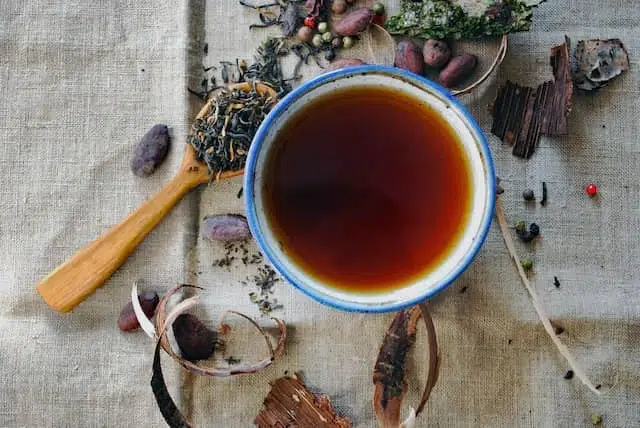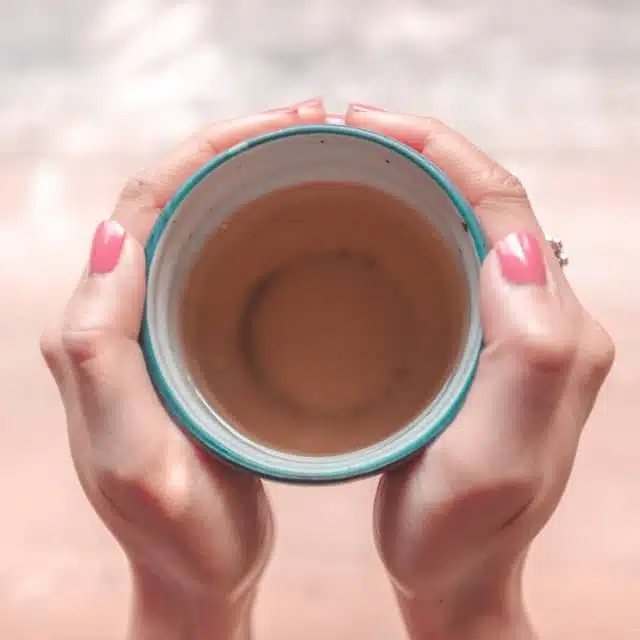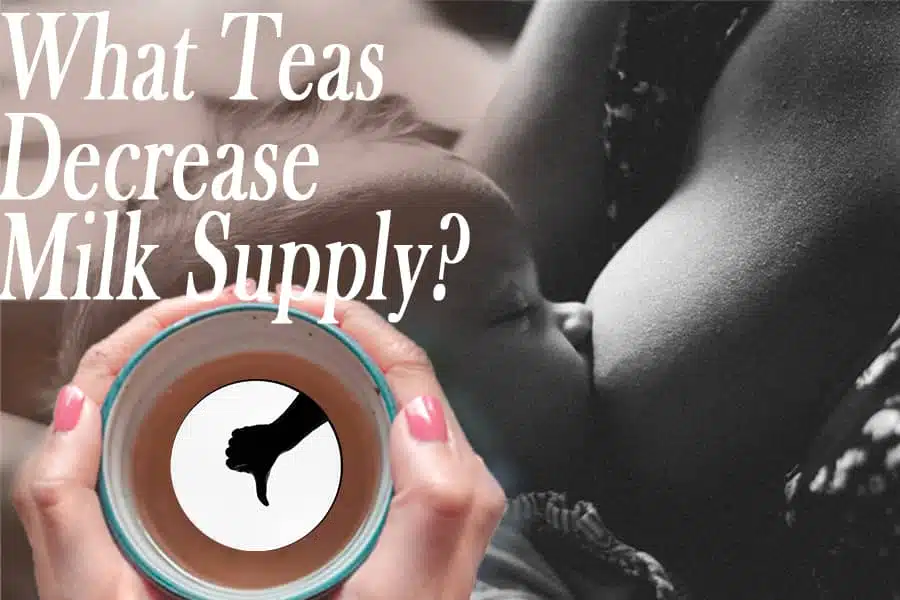Introduction:
After about 40 weeks of your pregnancy journey, you now have your bundle of joy, and it is time to breastfeed. Since you scaled through pregnancy without a miscarriage by avoiding some teas, there are teas or herbs you should be aware of that can affect milk supply. Your question now is, what teas decrease milk supply or what teas to avoid while breastfeeding?
While teas may have their benefits to our health, they can have a negative effect on a lactating mother. There is the conception that taking herbs after childbirth can help with some postpartum support for a new mother; unknowingly, these same teas decrease milk supply.
However, do not be scared if you have already been taking these teas; there is a volume to consume before an adverse effect can be noticed.
On the other hand, you may have the intentional need to decrease milk supply if your breast often gets too full. It would be best if you talked with a healthcare practitioner first.
This article is research-based from medical studies and journals and is focused on highlighting teas that decrease milk supply and why you may need to avoid them while breastfeeding.
Understanding The Breast and Milk Supply
The breast serves primarily to give feed to your newborn. On the other hand, it adorns your body and makes you the woman that you are.
Nonetheless, the essence of feeding your baby from your breasts comes from the ability to supply milk. Naturally, after delivery, the level of progesterone and estrogen reduces significantly, and then your body starts producing prolactin and oxytocin, which stimulates milk secretion (1).
One way to increase milk supply is to feed your baby frequently. The recommended practice is to feed your baby in the first hours, days, and weeks after birth. This will help produce more prolactin, which then produces more milk to serve your baby.
Milk supply progresses as the day goes by after delivery. Between 2 and 4 days, milk volume increases than the first 2-3 days when colostrum was supplied (1):
- On the third day, your baby will consume about 300 – 400 ml
- On the fifth day, 500 – 800 ml
- By the 7th to 14th day, the milk supplied is called transitional
- After two weeks, the milk supplied is called mature milk
- Within the first 6 months recommended exclusive breastfeeding period, milk consumption will average 800 ml per day
However, what sustains milk supply includes several factors beyond just prolactin after some weeks (1), and these include a healthy diet and nutritional requirements, adequate rest, lifestyle, and health status. Drinking teas contributes to your diet and, subsequently, your milk supply.
What Teas Decrease Milk Supply?

Therefore, milk supply is decreased when the level of prolactin produced by your body is reduced. As such, any tea or herbs that affect prolactin production subsequently affect milk supply.
Such teas and herbal therapies that may affect prolactin production and decrease milk supply include:
1. Chaste-tree berry (evidence-based report that it decreases milk supply)
The berry fruit from the chaste tree, often used to manage irregularities in menstrual cycle and cyclical breast pain, amongst others, (2) has a dual effect on prolactin production that can either be beneficial or otherwise.
According to LactMed® (2), low doses of chaste berry increases prolactin levels in the blood. As such, it is purported to be a galactagogue – a substance that can induce, maintain, and increase milk production (3). However, there are no scientific trials that validate this claim.
In the same report by LactMed® (2), there are shreds of evidence that reveal that chasteberry, in high doses, decreases prolactin levels in the blood and, as such, might decrease lactation. It was also reported to be used in Persian traditional medicine to decrease breastmilk oversupply (4).
From the reports, it is evident that chasteberry in higher doses suppresses prolactin release and reduces lactation, thereby negatively affecting breastfeeding (4), (5), (8).
However, you should be aware that chasteberry may have a dose-dependent effect when consumed. There are also side effects, albeit mild and reversible, from using chasteberry. Some of them include nausea, headache, gastrointestinal disturbances, and acne.
In summary, chasteberry should be avoided during breastfeeding (2).
2. Caraway (may have a lactogenic effect)
Though presumed, caraway is reported to have a lactogenic effect on breastfeeding mothers.
According to traditional Persian medicine (4), caraway administered orally alongside topical application when mixed with vinegar has been recommended to decrease oversupply of milk.
However, LactMed® (11) reported that from a study carried out on a group of nursing mothers, there was no effect on milk volume, either increased or decreased. It reported that no valid conclusion exists on the “galactagogue effects” of caraway.
3. Sage tea (most common herb that decreases milk supply)
Sage tea or extract is reported as the most common herb extract used to reduce milk supply and is often recommended (4), (8). However, there are not enough studies that back up its efficacy and how it may affect the baby.
On the other hand, there are known side effects (4), (8), (12), such as vomiting, nausea, and dizziness. This often occurs when taken in high doses.
The recommended preparation on how to take sage tea goes as follows (8):
- 1 – 3 g of dried sage leaves steeped in a cup of hot water
- 1 dose of the extract or 1 cup of tea should be taken the first time to observe the effect on milk supply and behavioral change in the infant
- If there isn’t a noticeable difference in milk supply between 8 – 12 hours, a more potent dose can be attempted.
- Once there’s an effect, such dose should only be used as needed, often as one dose every half day (12 hours) for 3 days to decrease milk supply.
Sage is considered safe when used in food than as a tea.
Other Herbs that can Decrease Milk Supply

1. Jasmine flowers (proven efficacy in reducing prolactin level)
Studies (6,7) have proven the efficacy of Jasmine flowers decreasing milk supply when applied to the breasts topically. They also help reduce breast engorgement.
2. Topical peppermint oil
It is reported in the Persian Medicine literature (4) that topical application of peppermint oil is suspected to decrease milk supply; however, it can be toxic for an infant, depending on the dosage applied.
A study, The Treatment of Maternal Hypergalactia (8), also reports that Peppermint oil might decrease milk supply when applied topically. However, in high doses, it can be toxic and should not come in contact with the infant (9).
If peppermint oil is to be used, it should be wiped off the nipple before feeding the baby.
3. Parsley tea (reduces prolactin level)
Parsley tea or leaves have been reported to reduce prolactin levels (8) and, subsequently, milk supply when taken orally (4) or eaten as food such as tabouli (8). When it comes to breast engorgement, hot compresses of parsley could also help (10).
However, LactMed® (10) claims “no scientifically valid clinical trials” support the use. In the same publication, there is a report that parsley increased milk supply.
Teas to Avoid While Breastfeeding
All the same, be it that some teas may decrease milk supply or you need to decrease your milk production, there are some teas that MUST be avoided when breastfeeding.
These teas are known to have serious health complications when taken while breastfeeding. Their consequence ranges from hormonal imbalance to infant health challenge from the breast milk taken.
They include:
- Chasteberry tea – chasteberry should be avoided during breastfeeding.
- Sage tea – Sage is considered safe when used in food than as a tea.
- Peppermint – peppermint oil should be avoided while breastfeeding.
Final thoughts
As a wrap-up, here’s an important question you need to answer. What is your intention about decreasing your milk supply?
Do you produce too much milk (breast engorgement, mastitis) and desire to reduce your milk supply?
Or are you looking to avoid some teas so you do not have a decreased milk supply?
You should seek professional help from a pediatrician or clinician before taking any of these teas or herbs as there are not enough reports or studies that confirm their efficacy and side effects. You should also consult with a professional healthcare provider for proper diagnosis and care.
Resources
(1) Milk production: The physiological basis of breastfeeding
(2) LactMed® – Drugs and Lactation Database: Chasteberry
(3) Galactagogue: Pharmacological overview of galactagogues
(4) Persian medicine: Management of Breast Milk Oversupply in Traditional Persian Medicine – full text here, (5) Safety and efficacy of chastetree (Vitex agnus-castus) during pregnancy and lactation
(6) Jasmin flowers: Suppression of puerperal lactation using jasmine flowers (Jasminum sambac) – full text here, (7) Jasmine flower extract lowers prolactin
(8) Sage: Treatment of Maternal Hypergalactia
(9) Peppermint oil: Use of herbal agents by breastfeeding women may affect infants – PubMed, SLACK Journals
(10) Parsley – LactMed® – Drugs and Lactation Database: Parsley
(11) Caraway – LactMed® – Drugs and Lactation Database: Caraway
(12) Sage – LactMed® – Drugs and Lactation Database: Sage
(13) Herbal therapies: ABM Clinical Protocol #32: Management of Hyperlactation
Other resources
LactMed® – Drugs and Lactation Database: Peppermint



